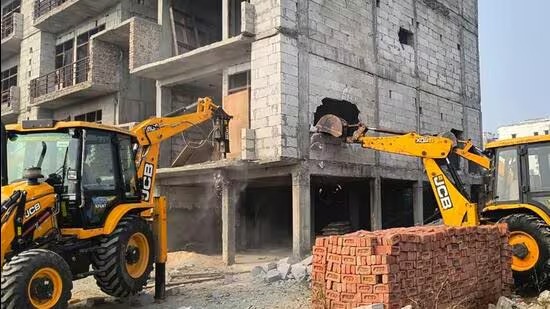
Supreme Court Rules Unauthorized Constructions Cannot Be Protected, But Owners Must Get Fair Hearing
Court sets aside Punjab and Haryana High Court order, says justice requires hearing affected parties
Judges stress that illegal buildings must be demolished, but due process cannot be ignored
By Our Legal Correspondent
New Delhi: November 21, 2025:
The Supreme Court of India has delivered a landmark ruling on unauthorized constructions, declaring that while such illegal structures cannot be shielded under the law, any action taken against them must follow the principles of natural justice and fair hearing.
A bench of Justice J.K. Maheshwari and Justice Vijay Bishnoi made the observations while hearing a case related to unauthorized constructions in Gurugram, Haryana, where the Punjab and Haryana High Court had issued sweeping directions for demolition without giving affected parties an opportunity to present their case.
Background of the Case
The matter originated from a Public Interest Litigation (PIL) filed in the Punjab and Haryana High Court concerning large-scale unauthorized constructions in Gurugram. The High Court directed removal of such constructions and curtailed the jurisdiction of civil courts, even though over 172 civil suits were already pending on the issue.
Aggrieved parties approached the Supreme Court, arguing that the High Court’s directions violated their right to be heard and ignored ongoing civil proceedings.
Supreme Court’s Observations
The Supreme Court set aside the High Court’s order, emphasizing that:
- Unauthorized or illegal constructions cannot be protected under law.
- However, owners and occupiers must be given a fair hearing before any demolition or punitive action.
- Courts must not adjudicate rights of parties without hearing them, as “opportunity of hearing is a sine qua non for fair administration of justice.”
The bench clarified that while illegal constructions must be dealt with firmly, justice cannot be delivered by bypassing due process.
Importance of Fair Hearing
The ruling underscores the principle that natural justice is central to the rule of law. Even when dealing with unauthorized constructions, authorities must:
- Issue proper notices.
- Allow owners and occupiers to present their case.
- Consider pending civil suits before passing demolition orders.
The court warned against blanket judicial directions that affect property rights without considering individual circumstances.
Unauthorized Constructions: A Growing Problem
Also Read: Supreme Court Questions Talaq-e-Hasan: How It Differs from Triple Talaq and Why It’s Under Scrutiny
Unauthorized constructions have become a major issue in urban India, particularly in fast-growing cities like Gurugram, Delhi, and Mumbai. These include:
- Residential properties converted into commercial use.
- Buildings erected without proper approvals.
- Encroachments on public land.
Such constructions often strain infrastructure, violate safety norms, and disrupt planned urban development. Courts have repeatedly held that illegal buildings must be demolished to uphold the integrity of urban planning.
Previous Supreme Court Rulings
The latest judgment builds on earlier Supreme Court decisions:
- In Kaniz Ahmed v. Sabuddin (2025), the court cautioned against “judicial regularisation” of illegal buildings, stressing that unauthorized constructions must be demolished.
- In several earlier cases, the court has ruled that payment of penalties or fees cannot regularize illegal structures.
Together, these rulings establish a strict judicial stance against unauthorized constructions, while also reinforcing the need for fairness in enforcement.
Balancing Law and Justice
Legal experts note that the Supreme Court’s ruling strikes a balance between strict enforcement of building laws and protection of individual rights.
On one hand, the court reaffirmed that unauthorized constructions cannot be legalized or protected. On the other, it insisted that owners must not be condemned unheard.
This dual approach ensures that urban planning laws are respected, while preventing arbitrary or unjust demolitions.
Impact on Urban Governance
The ruling has significant implications for municipal authorities and urban governance:
Also Read: Karnataka High Court Says Married Sisters Can Claim Motor Accident Compensation as Dependents
- Authorities must ensure proper procedures before demolishing illegal structures.
- Blanket orders without hearing affected parties may be struck down.
- Pending civil suits must be respected, preventing parallel or conflicting directions.
For citizens, the judgment provides reassurance that while illegal constructions will be dealt with, their right to be heard will not be denied.
Public Reaction
The decision has been welcomed by many legal commentators as a progressive step. Urban planners see it as a reminder that enforcement must be systematic and fair. Property owners facing demolition notices have expressed relief that the Supreme Court has insisted on due process.
At the same time, activists caution that unauthorized constructions remain a serious problem, and authorities must act decisively to prevent further violations.
Conclusion
The Supreme Court’s ruling on unauthorized constructions marks a crucial development in India’s urban law. By declaring that illegal buildings cannot be protected yet insisting that owners must be given a fair hearing, the court has reinforced both the rule of law and the principles of natural justice.
As cities continue to grapple with unauthorized constructions, the judgment provides a clear framework: demolitions must be carried out, but only after due process and fair hearing. This ensures that justice is not only done but also seen to be done.
Also Read: Bombay High Court Rules Arbitrators Lose Mandate If Proceedings Are Suspended Over Fee Disputes
🔑 Keywords for SEO & Faster Searches
- Supreme Court unauthorized constructions ruling
- Fair hearing demolition case India
- Gurugram illegal buildings Supreme Court judgment
- Punjab Haryana High Court unauthorized construction PIL
- SC sets aside demolition order unauthorized buildings
- Kaniz Ahmed vs Sabuddin unauthorized construction case
- Supreme Court natural justice urban planning
- Unauthorized construction demolition law India
- SC unauthorized construction fair hearing 2025
- Supreme Court building law enforcement India